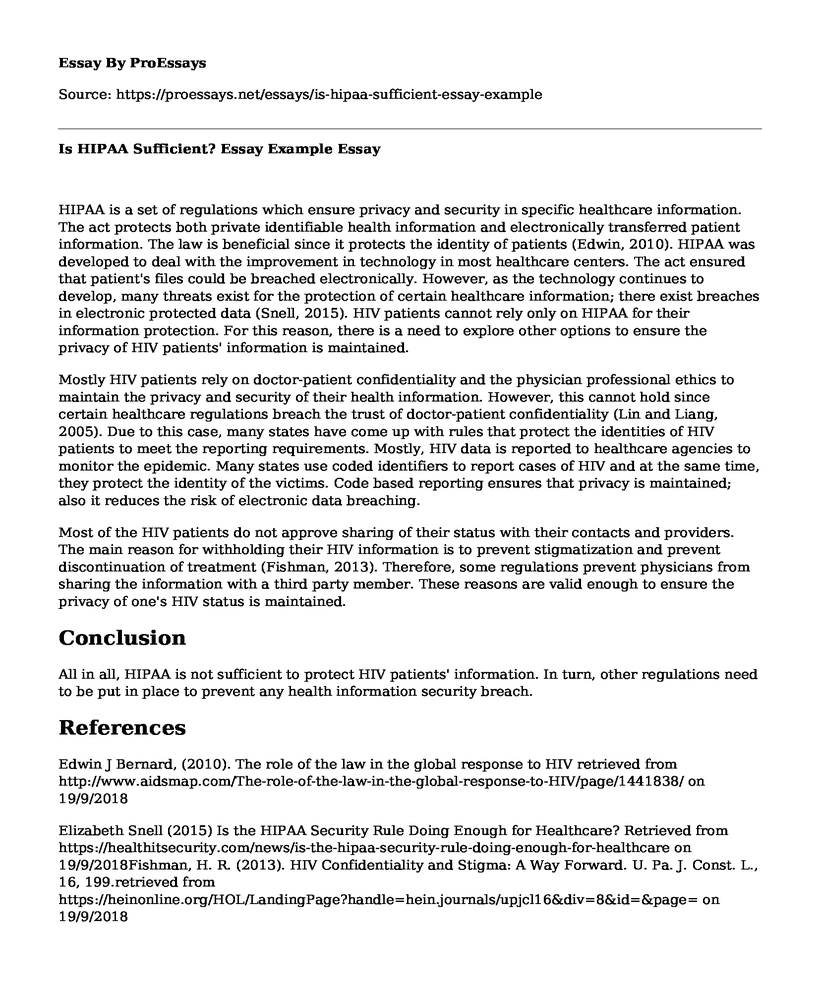HIPAA is a set of regulations which ensure privacy and security in specific healthcare information. The act protects both private identifiable health information and electronically transferred patient information. The law is beneficial since it protects the identity of patients (Edwin, 2010). HIPAA was developed to deal with the improvement in technology in most healthcare centers. The act ensured that patient's files could be breached electronically. However, as the technology continues to develop, many threats exist for the protection of certain healthcare information; there exist breaches in electronic protected data (Snell, 2015). HIV patients cannot rely only on HIPAA for their information protection. For this reason, there is a need to explore other options to ensure the privacy of HIV patients' information is maintained.
Mostly HIV patients rely on doctor-patient confidentiality and the physician professional ethics to maintain the privacy and security of their health information. However, this cannot hold since certain healthcare regulations breach the trust of doctor-patient confidentiality (Lin and Liang, 2005). Due to this case, many states have come up with rules that protect the identities of HIV patients to meet the reporting requirements. Mostly, HIV data is reported to healthcare agencies to monitor the epidemic. Many states use coded identifiers to report cases of HIV and at the same time, they protect the identity of the victims. Code based reporting ensures that privacy is maintained; also it reduces the risk of electronic data breaching.
Most of the HIV patients do not approve sharing of their status with their contacts and providers. The main reason for withholding their HIV information is to prevent stigmatization and prevent discontinuation of treatment (Fishman, 2013). Therefore, some regulations prevent physicians from sharing the information with a third party member. These reasons are valid enough to ensure the privacy of one's HIV status is maintained.
Conclusion
All in all, HIPAA is not sufficient to protect HIV patients' information. In turn, other regulations need to be put in place to prevent any health information security breach.
References
Edwin J Bernard, (2010). The role of the law in the global response to HIV retrieved from http://www.aidsmap.com/The-role-of-the-law-in-the-global-response-to-HIV/page/1441838/ on 19/9/2018
Elizabeth Snell (2015) Is the HIPAA Security Rule Doing Enough for Healthcare? Retrieved from https://healthitsecurity.com/news/is-the-hipaa-security-rule-doing-enough-for-healthcare on 19/9/2018Fishman, H. R. (2013). HIV Confidentiality and Stigma: A Way Forward. U. Pa. J. Const. L., 16, 199.retrieved from https://heinonline.org/HOL/LandingPage?handle=hein.journals/upjcl16&div=8&id=&page= on 19/9/2018
Laura Lin and Bryan A. Liang (2005) HIV and Health Law: Striking the Balance between Legal Mandates and Medical Ethics. Retrieved from https://journalofethics.ama-assn.org/article/hiv-and-health-law-striking-balance-between-legal-mandates-and-medical-ethics/2005-10 on 19/9/2018
Cite this page
Is HIPAA Sufficient? Essay Example. (2022, Jul 18). Retrieved from https://proessays.net/essays/is-hipaa-sufficient-essay-example
If you are the original author of this essay and no longer wish to have it published on the ProEssays website, please click below to request its removal:
- Research Paper Example: Benefits of Artificial Organs
- Application for the School of Nursing
- How The Environment Affects The Chances Of Cancer In Humans - Essay Sample
- Essay Sample on Parenteral and Enteral Nutrition in Special Populations
- Inpatient Falls: Prevention Strategies for Patient Safety - Annotated Bibliography
- Ideal Diet for Diabetics: How Sampling Can Help - Research Paper
- Essay Sample on Levels of Policy







